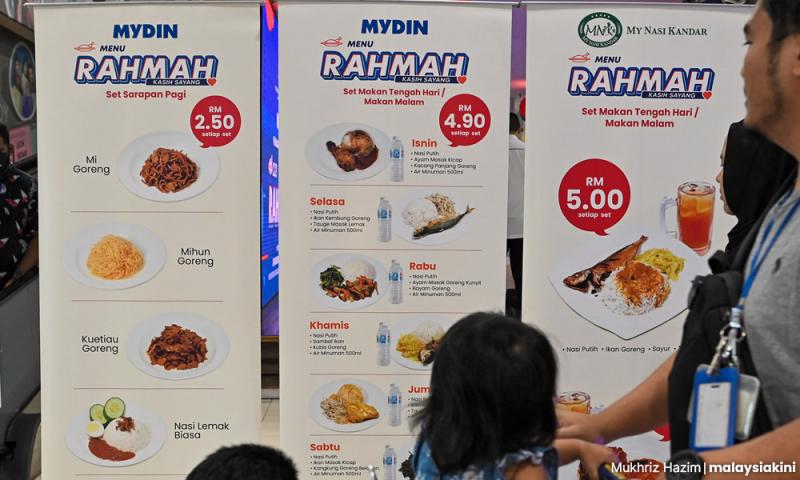LETTER | Stronger framework needed for Menu Rahmah
LETTER | The Menu Rahmah initiative by the Domestic Trade and Cost of Living Ministry which offers meals at RM5 and below has been applauded by groups of people from various backgrounds since its implementation on Jan 31.
More than 15,000 eatery operators across the country have voluntarily joined the initiative and responded to the government’s goal of aiding those in need, especially the B40 communities and hardcore poverty.
Students from tertiary institutions showed positive feedback by enjoying a proper meal at an affordable price. With the rising cost of living, the public also lauded this initiative as a timely cost.
With overwhelming responses from the public, this zero-budget government initiative encapsulates multidimensional verticals to be potentially absorbed into policy-making, which involved the engagement of different stakeholders not only on the shoulder of the ministry.
There is a need for a stronger framework for the Menu Rahmah initiative to propel and ensure sustainability to achieve long terms prospects.
For starters, a concrete regulatory and monitoring system needs to be strengthened to ensure the offerings of food and beverage on the menu, in terms of quality, portion, hygiene and type of food.
Regular spot checks and effective communication with traders at the local level via collaboration with local government, including Health Department and Education Department, needs to be strongly engaged.
More local watchdog channels via social media and digital platforms can be established to create awareness at a community level. The minister needs to be adamant and not compromise on the standard of food offered on the menu.
In fact, the menu needs to be tightly regulated to adhere to the food pyramid scheme by the Health Ministry. Knowing that the initiative aims to eradicate food poverty and curb rising living costs, the root cause needs to be tackled as well. With the increased cost of raw materials, traders are equally struggling to eke out a living.
Hence, regulators need to strike a balance by not only ensuring that the participating traders meet the needs of a balanced dietary which craft for different age groups but also protecting the welfare of traders. By doing so, it can snowball to attract more local traders from both urban and rural areas to participate.
A menu that prioritises balanced portions of protein, minerals and fibre, carbohydrates, and vitamins is essential to avoid health issues. In other words, Menu Rahmah needs to be considerate about the nutrition of food offered to the public from different age groups.
A menu guide could be provided to eateries that participate in the initiative. In fact, with more fast-food traders beginning to join the bandwagon, it is worrying that the goal of Menu Rahmah can be distorted and result in more health issues.
Furthermore, the synergy between food traders and stakeholders needs to be constantly uplifted to ensure the longevity of this initiative.
Apart from looking from the perspective of food security, the policymakers can also incorporate the government’s inspiration to achieve a green Malaysia in the ESG framework by encouraging the reduction of plastic containers in the menu.
Cultivating the habit of bringing own food box can not only reduce the cost of raw materials for traders but also minimise the disposal of one-time usage in plastic food containers.
Tax deductions could be given to Small and Medium Enterprises (SMEs) that respond to green initiatives in their business operations.
Knowing that the initiative is highly focused on an urban area, many vulnerable communities at the periphery may be discounted from the initiative.
The concept of partnership between NGOs and local communities under the Lagos Food Bank Initiative (LFBI) was a good example to be emulated in the Menu Rahmah initiative to reach out to more needy, such as vulnerable teenage mothers and children.
Under this programme, 300 communities in the slums of Lagos State, Nigeria were reached out via strategic partnership with stakeholders to advocate for sustainable food banking models across local government areas of Lagos State.
The ministry could consider extending collaboration with local NGOs to expand the radar of beneficiaries.
Food poverty does only hit heavily upon the B40 communities, but often time, many urban folks find it hard to sustain three decent meals in a day due to the skyrocketed cost of living.
Menu Rahmah could be an umbrella to explore more collaboration between local food traders and policymakers to achieve sustainable end goals in not only addressing the rising cost of living but also the alternatives to sustain food waste.
With multidimensional measures, we could definitely hit many birds with one stone.
The views expressed here are those of the author/contributor and do not necessarily represent the views of Malaysiakini.
RM12.50 / month
- Unlimited access to award-winning journalism
- Comment and share your opinions on all our articles
- Gift interesting stories to your friends
- Tax deductable
